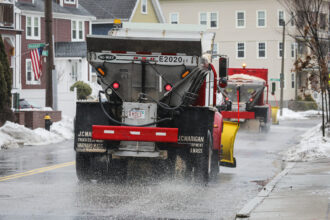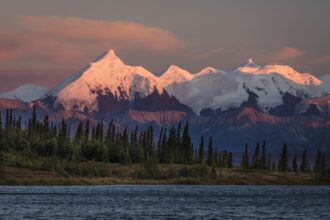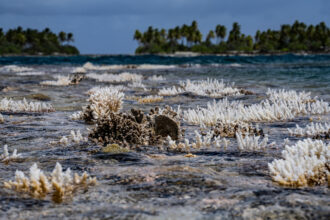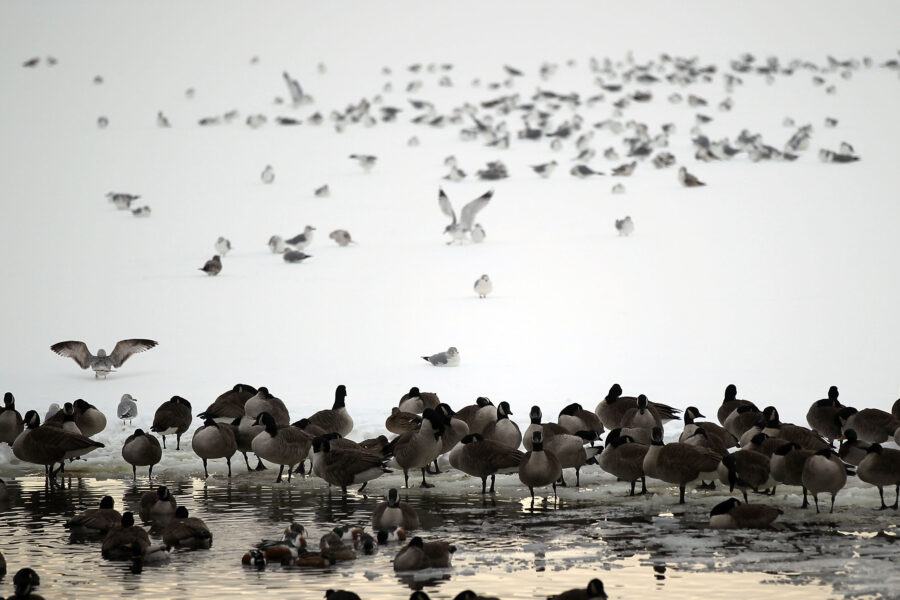It’s tiny, it’s silver and it’s at the center of a decades-long controversy over California’s water system.
It’s the delta smelt.
This threatened fish lives exclusively in the Sacramento-San Joaquin River Delta in northern California, where it depends on the slightly brackish water of the wetland. But the delta is also crucial for people, supplying water to around 30 million California residents and more than 6 million acres of farmland.
Like in many spaces where human needs overlap with species survival, this is where the debate begins.
In a Jan. 8 post on Truth Social, as wildfires raged through greater Los Angeles, then President-elect Donald Trump said California Gov. Gavin Newsom kept water from flowing into Southern California to ensure protections for “an essentially worthless fish called a smelt,” adding that there was “no water for fire hydrants.”
These claims have been repeatedly debunked by scientists and water experts, which my colleagues Wyatt Myskow and Martha Pskowski covered. Nonetheless, later in January, Trump issued two executive actions aimed at changing water management in California in a way that violates environmental laws, experts say.
Trump and other conservative politicians have played the delta smelt blame game many times in the past when discussing California’s constant struggle to fill its taps. However, research shows the reasons for the state’s water woes are far more complex and worsened by climate change.
While the smelt’s fate still hangs in the balance, its story shows how animals can be used as a tool to hamper environmental regulation, and could foreshadow future fights over endangered species protections under Trump, experts say.
“A certain 3-inch fish”: The Sacramento-San Joaquin River Delta once covered half a million acres of freshwater inland marsh, yet 98 percent of it has disappeared, largely converted to farmland. Starting in the 1930s, the federal government built a water infrastructure system and later California built its own state-run system, which both rely on massive pumps that help spread billions of gallons of water across the state each year. But this human-made infrastructure has altered the flows and therefore the salinity of the water.
This habitat degradation, along with severe droughts and invasive species threats, led to the precipitous decline of delta smelt in the 1980s. The species was first listed as threatened in 1993 under both the federal and state endangered species laws. In 2010, California upgraded the smelt’s listing status to endangered. These listings came with special protections for the fish, including modest limits on the amount of water that’s diverted from the delta for human usage, which helps maintain salinity levels and flow.
Farmers were angry about the decision because it can place some restrictions on how much water is available for crop irrigation. But the smelt controversy really popped off nationally in 2009, when conservative television host Sean Hannity dedicated an entire episode of his Fox News program to the “incredible suffering” that came with the government’s decision to “put the interest of a two-inch delta smelt … before the people of California.” Former Rep. Devin Nunes (R-Calif.) has also repeatedly criticized the “stupid little fish” since at least 2014, Politico reports.
Since then, the delta smelt has frequently remained in the limelight, according to a 2024 media analysis titled “How to divide people with things.”
“Before Hannity and Nunes grabbed ahold of the delta smelt, it wasn’t particularly famous, and it didn’t have a whole lot of political meaning,” study author Caleb Scoville told me. He’s an assistant professor of sociology at Tufts University who is currently working on a book about the delta smelt’s role in California’s so-called “water wars.”
“Once they were able to imbue [the smelt] with that kind of meaning, or construct it as a divisive entity, it took on a life of its own,” he said.
Eventually, Trump joined in. During his first run for office in 2016, amid one of California’s worst droughts in history, Trump told a crowd at a rally in Fresno that “there is no drought.” Instead, he claimed that the government was taking the water and “shoving it out to sea” because environmentalists are “trying to protect a certain 3-inch fish.”
Meanwhile, the population of the 3-inch fish in question has continued to decline, especially as climate change warms the delta and fuels more intense droughts. Many experts describe delta smelt as functionally extinct, “meaning they’re so rare they effectively provide no function in their ecosystem, such as feeding predators,” Vox’s Benji Jones reports.
This has left some questioning why protections that hinder farming are still in place for a fish that is rarely seen. But others argue that the water pumping regulations also protect other vulnerable species like Chinook salmon and the related longfin smelt and help to support overall ecosystem health. Proper water management is crucial in the face of climate change, said Jeffrey Mount, a senior fellow at the nonpartisan Public Policy Institute of California’s Water Policy Center.
“We haven’t been able to keep up with the pace of change,” he told me. “The science hasn’t, the policies haven’t, the actions have not. We just kept continuously falling behind. And so we’re going to see some really big consequences of that. And then comes the Trump administration, when the likelihood of progress is very low.”
Now, using the context of the LA fires, Trump is targeting the fish in a bid to revise the environmental regulations that aim to protect it. His administration issued a Jan. 20 memorandum to “route more water from the Sacramento–San Joaquin Delta to other parts of the state,” which was halted “allegedly in protection of the Delta smelt and other species of fish.” A Jan. 24 executive order takes this further by directing the Interior and Commerce secretaries to “immediately take actions to override existing activities that unduly burden efforts to maximize water deliveries.”
What Happens Next? So where do these orders leave the delta smelt? Well, so far, nothing has changed legislatively nor has the fish’s legal population status, said Jennifer Harder, a law professor at the University of the Pacific.
“Once a species is listed, the federal government has a legal obligation to ensure that its actions do not jeopardize the continued existence of the species or adversely modify habitat that has been designated as ‘critical habitat,’” she told me over email. She also works with the PPIC Water Policy Center. “Until a change in status is issued, all ESA protections continue to apply.”
There have been some news reports stating that federal funding was pulled from a captive breeding program intended to ensure survival of the delta smelt, which is run by scientists at the University of California, Davis. However, that’s not quite the case—at least at the moment. Rather, the contract has not yet been renewed, said Bill Kisliuk, a communications manager at UC Davis.
The UC Davis Fish Conservation and Culture Laboratory is working with the Bureau of Reclamation and hopes to see funding extended past Feb. 28, he said in an emailed statement to ICN. “The bureau and UC Davis have worked cooperatively on the FCCL for more than 15 years, and have been working on the five-year renewal for the past six months.”
The university “expects to maintain the lab’s core functions as we prepare to implement a continuity plan,” he added.
Even if federal protections are removed, the delta smelt is still protected under California state law, which means that the state would still be obligated to protect the species under state species, water rights and water quality laws.
However, one of the broad issues remains: “Fish v. people is the wrong calculus,” Harder said in her email. “Ultimately, using the Delta smelt or any other single species as a political football isn’t going to do anything to improve the serious water issues faced by the people of California—a key fact that is repeatedly missed is that thriving, biodiverse ecosystems and a robust economy go hand-and-hand.”
It’s not the first time threatened animals have been used as a political tool to fuel opposition.
After a number of whales started to wash ashore along the East Coast in 2022, conservative policy groups and fossil fuel interests funded anti-offshore wind campaigns to “save the whales,” despite no evidence linking their deaths to the turbines, according to research led by Brown University. Endangered northern spotted owls, which live in the old-growth forests of northern California, have also long been at the heart of political controversy between environmentalists and the timber industry, Oregon Public Broadcasting reports.
While regulations surrounding the delta smelt under Trump are up in the air, the ire this species has received by conservative politicians, particularly during the LA fires, could be an indicator of things to come, Scoville says. Meanwhile, global biodiversity is plummeting at a dangerous rate.
“If you were to remove the delta smelt from the equation, whatever anyone thinks, [that] would not actually radically change or solve the problems that are faced by agriculture in the San Joaquin Valley,” he said. “It’s a symbolic and … story-rich cover for claiming that we need to either repeal, weaken or otherwise not enforce the Endangered Species Act.”
More Top Climate News
New York is being sued by 22 other states and a coalition of fossil fuel interests that oppose a recently approved law that holds high-emitting companies financially accountable for their contributions to climate change, Hilary Howard reports for The New York Times. The Climate Change Superfund Act requires the biggest producers of greenhouse gas emissions between the years 2000 and 2024 to pay a combined total of $3 billion annually for the next 25 years. These funds will go toward climate adaptation and mitigation, including upgrades and repairs for weather-battered infrastructure, restoration of coastal wetlands and installation of energy-efficient cooling systems in buildings. It’s similar to a law passed by Vermont in May, which is also facing legal challenges, as journalist Olivia Gieger reported for Inside Climate News.
Meanwhile, employees at the National Oceanic and Atmospheric Administration were told to pause work with foreign nationals, including those working directly with the U.S. government, Dell Cameron reports for Wired. Further, the email order directs NOAA Fisheries employees, who are responsible for promoting the conservation of marine life and helping manage seafood resources, “to submit details of any ongoing work with international partners for vetting by higher-ups,” Cameron writes. Elon Musk’s Department of Government Efficiency (which is not an official government department) has reportedly entered the agency’s headquarters, and sources told The Verge that they’re concerned about potential changes to the public’s access to federal weather forecasts and climate data.
Scientists successfully bred a variety of rice they say reduces methane emissions by 70 percent, while delivering yields nearly twice the global average, Matt Simon reports for Grist. Rice cultivation is currently responsible for 12 percent of humanity’s global methane emissions—a potent climate-warming gas. There are limitations on where the new variety can be grown, which could pose some setbacks for scaling up production in the future, but the scientists are working on finding additional varieties that can handle different temperatures.
In some more light-hearted news, a new study found that whale songs share more structural patterns with human language than we thought. By analyzing different cetacean tunes, a team of international researchers found that some elements are used far more frequently than others—similar to how humans use the word “the” a lot (see, I just used it twice!).
“Human language and whale song are both culturally learned, so whales learn the songs from the other whales that they spend time with. So that’s why all the whales in one population will be singing the same song,” Jenny Allen, a whale researcher at Griffith University told The Guardian. “The only other species where you see learning on that spatial scale is in humans.”
About This Story
Perhaps you noticed: This story, like all the news we publish, is free to read. That’s because Inside Climate News is a 501c3 nonprofit organization. We do not charge a subscription fee, lock our news behind a paywall, or clutter our website with ads. We make our news on climate and the environment freely available to you and anyone who wants it.
That’s not all. We also share our news for free with scores of other media organizations around the country. Many of them can’t afford to do environmental journalism of their own. We’ve built bureaus from coast to coast to report local stories, collaborate with local newsrooms and co-publish articles so that this vital work is shared as widely as possible.
Two of us launched ICN in 2007. Six years later we earned a Pulitzer Prize for National Reporting, and now we run the oldest and largest dedicated climate newsroom in the nation. We tell the story in all its complexity. We hold polluters accountable. We expose environmental injustice. We debunk misinformation. We scrutinize solutions and inspire action.
Donations from readers like you fund every aspect of what we do. If you don’t already, will you support our ongoing work, our reporting on the biggest crisis facing our planet, and help us reach even more readers in more places?
Please take a moment to make a tax-deductible donation. Every one of them makes a difference.
Thank you,













